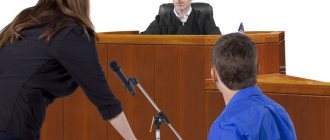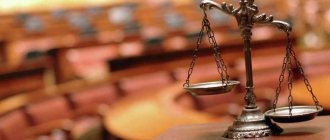New edition of Art. 190 Code of Civil Procedure of the Russian Federation
1. Judicial debates consist of speeches by persons participating in the case and their representatives. In judicial debates, the plaintiff, his representative, speaks first, then the defendant, his representative.
2. The third party, who has declared an independent claim regarding the subject of the dispute in the initiated process, and his representative in the judicial debate speak after the parties and their representatives. The third party, who has not made independent claims regarding the subject of the dispute, and his representative in the judicial debate speak after the plaintiff or defendant, on the side of one of whom the third party participates in the case.
3. The prosecutor, representatives of state bodies, local government bodies, organizations and citizens who have applied to the court for the protection of the rights and legitimate interests of other persons speak first in the judicial debate.
4. After speeches have been made by all persons participating in the case and their representatives, they can make remarks in connection with what has been said. The right of the last remark always belongs to the defendant, his representative.
What are legal pleadings?
The arguments of the parties are considered to be statements by the participants in the proceedings about the evidence in the case, the guilt of the defendant and the outcome of the case. A strictly defined circle of people can present arguments in the case. The order of debate is regulated by Chapter 38 of the Code of Criminal Procedure of the Russian Federation.
The prosecutor and the defense attorney are required to participate in the debate between the parties in criminal proceedings, but also, with the permission of the court, the victim, the defendant, and in civil cases - the plaintiff, the defendant and their legal representatives can speak.
The time for speaking is not limited, but the Criminal Procedure Code of the Russian Federation states that the judge has the right to stop a participant in the debate if he deviates from the essence of the case.
Only the court can ask questions to the speakers, but after the speech, the opposite party to the proceeding has the right to respond to the arguments of the previous participant in the debate between the parties.
Recommendations from professionals
To win in a civil or any other case, you can study a clear example of how debates proceed at a court hearing. Based on the successful speeches of others, it will be easier to compose a speech for yourself. Experienced lawyers recommend drafting it in such a way that the speech actually represents a draft court decision. What is meant is not so much its description as its motivation.
The lawyer’s professionalism plays a significant role in the debate. On his part, legal analysis is mandatory. It should be:
- verified from a logical point of view;
- be based on legislative acts and legal norms.
The lawyer examines the evidence that was presented during the trial. He also looks for weak spots in his opponent’s arguments and reinforces his own position.
Most often, problems with speech arise in arbitration or civil proceedings, since the judge does not give the parties time to prepare. But it should be recalled that all participants in the case have the right to apply for a break. Even if it is only a few minutes, you will already be able to concentrate and think about how to structure your speech.
Why are debates between the parties necessary?
The main purpose of judicial debate in criminal proceedings is to ensure compliance with the principle of adversarial proceedings. The goals of the speakers are radically different. The prosecutor tries to prove the guilt of the defendant and substantiate his position with the materials of the case. The defender, depending on the chosen tactics, either denies his client’s guilt or admits it, but indicates the grounds for mitigating the punishment. The line of defense must be based on the defendant's attitude towards the prosecution. If he does not admit his guilt, then the lawyer must deny it.
The judge is obliged to take into account the speeches in the debate when making a decision on the case. Sometimes this stage of the proceedings leads to an additional review of all case materials, a rehearing and new arguments between the parties. Only after them the court makes a decision on the case.
The defendant, having decided to speak in the debate between the parties, also retains the right to the last word at the end of the entire trial and before the judge retires to the deliberation room.
Legal practice and the meaning of the debate
Not all lawyers share the same opinion about the advisability of participating in judicial debates. Some experts are confident that by this stage of the proceedings the judge has already formed a certain view of the case. Therefore, you should not rely on debate between the parties, or hope that discussion of the issue will allow you to persuade the representative of the law to your position. More than one example from judicial practice shows that not everything is so simple and unambiguous.
Read also: What is the punishment for beatings under Article 116 of the Criminal Code of the Russian Federation
It is not uncommon when, during the examination of evidence, a new vision of the conflict is revealed to the plaintiff or defendant. This is why some claimants abandon their own claims at this stage of the proceedings. There are also precedents when the defendant admits all the claims of the plaintiff.
There are examples when lawyers recommend that their clients refuse to argue. Alternatively, they are advised to report that the person is simply sticking to his previously stated position. Or you can read the lawsuit (response to it), starting with a respectful address to the judge. But in this case, you really shouldn’t hope that the court will reconsider the existing impression of the case.
Many lawyers are convinced that the debate between the parties should not be ignored, nor should they be taken lightly. After all, history knows precedents when the court makes an undesirable decision on a claim, although during the proceedings it seems that it was ready to support the claim as a whole or in some part of it. Do not forget about the purely human factor: the judge may simply make a mistake or follow the lead of the party, which will more colorfully and substantively confirm its position at the final stage of the consideration of the case.
Statement by the State Prosecutor
During the speech, the prosecutor requests the maximum sentence for the defendant, taking into account the qualifications of the case. In his speech, the prosecutor states:
- the circumstances of the case listed in the charge sheet;
- charging the defendant in accordance with the provisions of the Criminal Code of the Russian Federation;
- aggravating circumstances, if any;
- extenuating circumstances. But the prosecutor does not focus on them. This is the task of the defender.
In the speech of the prosecutor, a characterization of the defendant is given, taking into account his life circumstances. In particular, the prosecutor will indicate whether this citizen has previously been convicted, whether he is registered with a narcologist, whether he has a job and place of residence. Particular attention is paid to compensation for damages to defendants.
Have a question for a lawyer? Ask now, call and get a free consultation from leading lawyers in your city. We will answer your questions quickly and try to help with your specific case.
Telephone in Moscow and the Moscow region: +7
Phone in St. Petersburg and Leningrad region: +7
Free hotline throughout Russia: 8 (800) 301-39-20
Statement by the victim and private prosecutor
The judge is obliged to ask the victim about his desire to speak in the debate of the parties in the criminal case. In civil cases, the victim acts as an accuser and independently puts forward demands for recovery of damages from the defendant.
In the speech, the victim says:
- about the damage caused;
- its compensation to the defendant;
- necessary punishment for the culprit.
In criminal cases, the victim may agree with the prosecutor's demands, but may also ask the court to reduce the defendant's sentence.
Lawyer in debate. criminal and civil proceedings
Lawyer in the debate between the parties.
Criminal and civil proceedings.
The debate between the parties is perhaps the most important and important part of a lawyer’s speech at a court hearing. Regardless of what process the lawyer’s debate will take place, in civil or criminal proceedings, it is necessary to prepare for them very carefully and painstakingly.
The difficulty of the debate lies in the fact that it is impossible to prepare for this type of speech in advance, as it is possible to prepare for an explanation of a claim or other speeches of a lawyer in a criminal case. A pleading is a speech that concludes a criminal or civil trial. In his meaningful speech, the lawyer must take into account what has been said and the opinions of other participants; the controversy that took place during the trial of the case must be continued in the debate as an argument in support of his position. If a lawyer makes a debate in a criminal trial, then they must critically “go through” the prosecutor’s indictment. It is impossible to prepare for the debate; usually experienced lawyers prepare theses for speaking in the debate.
Basically, before speaking in the debate, new facts and evidence appear in the process that were not known to the parties at the first stages of the trial. It is impossible to predict the testimony of witnesses, the emergence of new evidence, the presentation of specialists and the conclusions of forensic examinations. Skillfully maneuvering the examined evidence, a criminal lawyer must convince the court during the debate why the evidence he presented of his client’s innocence is more convincing than the prosecutor’s indictment. Why is this or that evidence not relevant and essentially inadmissible? The arguments presented in the debate must be logically consistent in their conclusions, easily perceived by the court, the prosecutor, and other participants in the process.
In practice, the lawyer's speech in the debate is often interrupted by the court. During the speech, the court asks the lawyer to clarify certain facts and evidence, may ask to speed up the speech, not to “get hung up” on evidence that has not been examined by the court, and so on. In fact, the court can interrupt the speech of a lawyer in a responsible position and, if the debate is poorly prepared, then the speaker will not be able to bring his speech to its logical conclusion. In speeches, you need to be prepared for any turn of events - answer the court’s questions, keeping the main idea in your head and persistently relying on your knowledge of the law and the circumstances of the criminal or civil process to carry out your chosen position on the case to the end.
Suffice it to say - a speech in a debate is a complete improvisation of a speech, filled with a meaningful, explanatory explanation of the position of the lawyer and his client. As mentioned above, the lawyer comes out to speak most often with prepared theses, which are aimed at emphasizing the main events and which, in the process of the lawyer’s speech, acquire their bright and, most importantly, convincing content. Great experts in debates recommend that lawyers keep notes in advance of questions that they need to answer themselves, while turning to the court. I can only assure you that it is impossible to predict what may happen before the lawyer speaks in the debate on the main criminal case (for example, the expiration of the statute of limitations, the prosecutor’s refusal to charge), but you need to seriously prepare for them. Taking the floor in the debate can be a complete surprise both for the lawyer and for his client, the client. The process of criminal proceedings is a complete unforeseen “obstacle course” and by the end of the court session, questions arise from the client to his lawyer on certain issues of the dispute. At the first stages, the client seems to understand the lawyer, but at the end of the case, the opposite happens. In connection with these circumstances, it is necessary to make adjustments to the speech in one direction or another, but not to the detriment of the “common cause.” Experienced lawyers sometimes simply do not advise their client to speak in the debate, but to answer the court that they fully support the speeches of their lawyer. This just does not apply to the last word of the accused in criminal proceedings.
The need to adjust the speech in the debate may also become mandatory if the court, after hearing the participants in the trial, taking into account the emergence of new evidence, resumes the criminal or civil process. In this case, new, unknown evidence appears that requires additional study and analysis. The difficulty lies in the fact that the court may limit the lawyer’s preparation for speaking under new circumstances and then, due to insufficient time for preparation, the defender will need to rely only on his professionalism and complete improvisation. The main task of these contingencies in a criminal or civil process is to find a complete understanding of the criminal lawyer and the client, the client of the lawyer and his confidant. It looks funny when a lawyer and his client speak with complete discrepancies. In practice, there was a case when the accused, during the consideration of a criminal case, at the final stage, in the debate asked the court for an acquittal, citing his complete innocence in the crime committed, and the defense lawyer asked the court not to punish his client strictly and, as far as possible, to sentence him to probation punishment due to the fact that the crime he committed is not particularly dangerous to society. As a result, the court sentenced the accused to a real term of imprisonment.
Stormy debates, as a rule, end with remarks.
Replies are summaries to what has already been said in the debate. They are very short in content and convincing in their wording. A remark, usually directed towards one's procedural opponent, should not be offensive. In his judicial and concluding remarks addressed to the court, summing up the speeches in the debate, the lawyer, with his convincing request, asks the court to pay attention specifically to his presented evidence. The remark should not repeat what was said in the debate and, if possible, it is necessary to exclude all kinds of grievances and unpleasant wishes for each other at the end of the dispute.
Judicial practice, both in criminal and civil cases, has a wide variety of striking examples of both good and not very pleasant speeches in remarks. Most experienced lawyers agree on one thing. The judge, like a normal person, watches the performance of the lawyers in the debate and what especially sticks in his head is the remarks of the parties and the last word of the accused. As a rule, in a criminal trial, the last word is given to the accused and my advice to my future clients: do not be offended by justice at this most crucial moment for deciding your fate, and if you feel even an “iot” guilty, gather yourself into a single “nervous ball” and repent in what you have done and ask for leniency. You will be heard and you will be honored.
Defender's statement
After the prosecutor, the lawyer speaks in the debate between the parties. He may ask to acquit the defendant if the latter does not admit his guilt. Otherwise, the lawyer will ask to reduce the defendant’s sentence to the minimum possible, based on the circumstances that give him the right to do so.
The defender's speech will say:
- about agreement or disagreement with the classification of the crime;
- absence of aggravating circumstances;
- aspects justifying the actions of the defendant;
- the presence of mitigating circumstances and positive characteristics of the defendant.
The lawyer’s goal in the debate between the parties in court is to present his client in the best light, proving the absence of his guilt in the crime in question or the presence of reasons for its commission, which provide for the imposition of a more lenient punishment.
Defense speech of a lawyer
The lawyer speaking at the debate makes a speech called a “defensive speech.” This is a type of judicial speech. According to the definition of T.L. Zhivulina and S.V. Travina “a judicial speech is a public speech, which is a statement of the speaker’s conclusions on a specific case and his objections to the opponent” [2].
In each individual case, the content of the lawyer’s speech is determined by the specific tasks of the defense in the case, which, in turn, are determined by the nature of the crime and other features of the case, as well as the collected evidence. But regardless of the circumstances of the case, each speech of the defense attorney includes certain components such as:
And if the information posted on our website was useful to you, please share it on social networks.
Speech by the defendant
The peculiarity of the defendant’s speech is that after the debate he will have the right to the last word. These two speeches are not much different in content, so defendants often refuse the last word.
The main thing that the defendant must note is:
- does he admit his guilt;
- whether he regrets what he did and whether he compensated the victim for the damage;
- whether he has grounds to ask for a reduced sentence.
To summarize, this debater must ask the court to acquit him or reduce his punishment.
How does this process work?
Of course, the debate is such a part of court cases that must necessarily take place in accordance with the procedures established by civil procedural legislation. First of all, the court must issue a ruling at the moment when it accepts the statement of claim. With this determination, she either accepts the claim for consideration or rejects it (in the event that it was filed without complying with the necessary rules and regulations).
After this stage, the examination of the evidence that was provided along with the claim begins. Once these have been studied, the debate itself begins. The most difficult in legal terms are questions of inheritance, since a fairly large number of “pitfalls” can appear here. As a rule, the debate takes place in a special room, which is reserved for these processes. Experts say that it is best to prepare all the information separately so that it can later be applied to the case.
How to behave during court hearings?
The Code of Criminal Procedure of the Russian Federation defines the requirements for holding debates between the parties. Participants in the process are required to speak on the merits of the case and not interrupt each other. The law prohibits asking questions of other speakers. Only the court has this right. However, it is possible to respond to the opposing party’s speech after it has ended.
The key component of the debate is the guilt of the defendant and his punishment. Since the goals of the speakers are different, they strive to present this topic from their own positions. In this case, participants in the debate are required to rely on the evidence base in the case.
Procedural rules
Debate is a complex process, so its procedural rules are known only to professional lawyers. Firstly, you should know that it is necessary to accumulate evidence that was collected earlier into one whole. It does not matter whether you are a plaintiff or a defender. After completion, the court gives each party the opportunity to add remarks, if any. This stage of the trial is considered the most striking and memorable, because here the lawyer has to make every effort to show how good a speaker he is.







